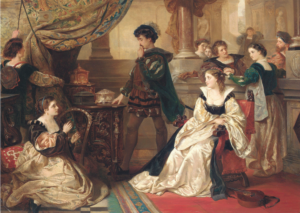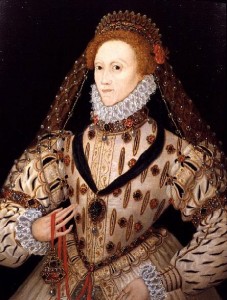The Duke in Shakespeare’s Measure For Measure plays a role in nearly every affair between characters throughout the play. Whether he is explicitly fulfilling his role as the Duke of Vienna or in disguise as a friar, the Duke acts as a puppeteer and pulls most of the strings throughout the play. Continue reading
Tag Archives: law
Keep the Government out of the Bedroom
In Shakespeare’s Measure for Measure there exists a paradox of the punishment of fornication only being able to be lifted by more fornication. I am referring to the deal that Angelo attempts to make with Isabella, her virginity for her brothers freedom. This issue, however, is reflective of a greater anxiety of the state invading personal spaces. From Claudio’s arrest to the loss of Mistress Overdone’s livelihood to the bargaining of Isabella’s virginity, the destructiveness of the state’s involvement with matters concerning sex as an anxiety of the play is evident. Continue reading
Artificial Anxiety of the Bachelor

‘The Three Caskets’: The Merchant Of Venice, Act III, Scene II. Robert Alexander Hillingford. Oil on Canvas.
The will of Portia’s father immediately surfaces as the central obstacle to the comedic plot-line of The Merchant of Venice. It is a clear example of a patriarch’s legal posthumous authority. Portia’s role as the central female protagonist leads most critics to focus on the restrictions that the will sets on her freedom. Much less discussed is the will’s control over Portia’s numerous male suitors.
Mercy in the Courtroom: How Shakespeare Uses the Law to Influence Audiences
It is difficult to know whether it was Shakespeare’s intent to make his character Shylock in The Merchant of Venice a sympathetic character or a Jewish villain to satisfy an anti-Semitic audience. Clues to this debate can be gathered if we carefully consider Shakespeare’s treatment of Shylock in the courtroom. A conflict of mercy vs. vengeance and between the spirit and letter of the law become apparent in the courtroom scene of Act IV. Mercy is a central theme to both Christianity and Judaism and is used by Shakespeare to make larger claims about such religions. Continue reading
Elizabethan Dress, Costume and Controversy
The fashion excesses of the Elizabethan era dwarf even the most outrageous walkways in Milan today. One earl was reported as spending half his annual income on clothing alone. It was common practice for landlords to part with some of their valuable turf merely to bolster their closets. The wealthy swanked about in outfits often richly decked with gold, silver and jewelry, elaborately ruffled and stitched to the very bottom seam. Continue reading

